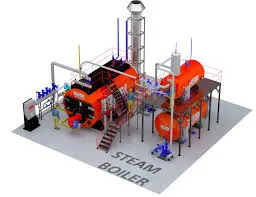
Қыр . 25, 2024 16:49 Back to list
what does a biomass boiler burn
What Does a Biomass Boiler Burn?
Biomass boilers represent a sustainable heating solution, utilizing organic materials to produce heat and hot water for homes and businesses. As the world moves toward sustainable energy practices, understanding what biomass boilers burn is crucial for appreciating their role in renewable energy systems.
Definition of Biomass
Biomass refers to any organic material derived from plants and animals that can be used as a source of energy. This includes agricultural residues, wood, and even organic waste. Common biomass materials that can be used in boilers include wood pellets, wood chips, straw, corn husks, and various agricultural byproducts. The choice of biomass fuel often depends on local availability, which affects pricing and transportation costs.
How Biomass Boilers Work
Biomass boilers operate similarly to traditional fossil fuel boilers but with a primary difference they burn biomass instead of coal, oil, or natural gas. The combustion process in a biomass boiler involves the following steps
1. Fuel Supply Biomass fuel is stored in a designated area, often in a hopper. The size and design of the storage area depend on the volume of fuel needed.
2. Feeding Mechanism A feed system transports the biomass fuel from the storage area to the combustion chamber. This can be accomplished through augers or conveyors.
3. Combustion Once the biomass reaches the combustion chamber, it is ignited. The combustion process generates heat, heating water within the boiler system. Modern biomass boilers are equipped with advanced technology to ensure optimal combustion, reducing emissions and increasing efficiency.
4. Heat Transfer The generated heat is transferred to the water circulating through the heating system, providing warmth for radiators, underfloor heating, or hot water.
5. Flue Gas Treatment After combustion, flue gases are released. Modern biomass boilers typically include filtration systems that reduce pollutants, ensuring that emissions meet environmental standards.
Types of Biomass Fuels
what does a biomass boiler burn

Several types of biomass can be used in boilers, each offering different benefits
- Wood Pellets Made from compacted sawdust, wood pellets are a popular choice due to their high energy density and ease of handling. They burn cleanly and produce less ash compared to other biomass fuels.
- Wood Chips Larger than pellets, wood chips can be sourced from various types of wood, making them a versatile option. They are commonly used in larger commercial biomass boilers.
- Agricultural Residues Byproducts from farming, such as straw, corn stalks, and other plant remnants, provide an eco-friendly option for biomass fuel. Utilizing these materials helps reduce waste and contributes to a circular economy.
- Energy Crops Some crops, specifically grown for energy production, include miscanthus and switchgrass. These crops can be harvested efficiently and have high energy yields.
Environmental Benefits
Burning biomass in boilers can significantly reduce carbon emissions compared to fossil fuels. Biomass is considered carbon-neutral because the carbon dioxide (CO2) released during combustion is roughly equal to the CO2 absorbed by the plants during their growth. Additionally, using waste products as fuel helps mitigate landfill use and lowers methane emissions associated with decomposition.
Considerations and Challenges
While biomass boilers present many benefits, there are also considerations to account for. Sustainable sourcing of biomass is essential to avoid deforestation and ensure a continuous supply. Establishing a reliable local supply chain can be challenging, especially in areas with limited agricultural activity.
Moreover, moisture content in biomass fuels affects combustion efficiency. High moisture levels can lead to lower energy output and increased emissions. Therefore, properly drying and storing biomass fuels is vital to the overall effectiveness of a biomass boiler.
Conclusion
In summary, biomass boilers are a viable alternative to traditional fossil fuel heating systems, utilizing a variety of organic materials as fuel. Understanding what biomass boilers burn helps highlight their sustainable nature and the potential they hold in combating climate change. As technology advances and practices improve, biomass energy will likely play an increasingly significant role in our transition to a greener future. The journey toward sustainable energy is ongoing, and biomass boilers represent one of many steps in the right direction.
-
High-Efficiency Commercial Oil Fired Steam Boiler for Industry
NewsJul.30,2025
-
High-Efficiency Biomass Fired Thermal Oil Boiler Solutions
NewsJul.30,2025
-
High Efficiency Gas Fired Thermal Oil Boiler for Industrial Heating
NewsJul.29,2025
-
High-Efficiency Gas Fired Hot Water Boiler for Sale – Reliable & Affordable
NewsJul.29,2025
-
High Efficiency Biomass Fired Hot Water Boiler for Industrial and Commercial Use
NewsJul.29,2025
-
High-Efficiency Biomass Fired Hot Water Boiler for Industrial Use
NewsJul.28,2025
Related PRODUCTS






















